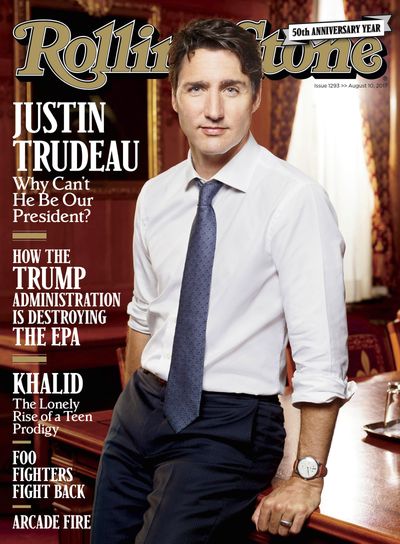Trudeau presses for legal pot this summer as Senate wavers

Prime Minister Justin Trudeau is pressing ahead with a goal of legalizing recreational marijuana in Canada within months, as senators push for changes and a delay of as much as a year.
The government’s pot law is working its way through the Senate, where a trio of lawmaker reports has this week called for changes or a delay. While the government didn’t welcome or rule out an extension, there’s little sign it will pump the brakes. Trudeau says the push will continue as scheduled, and a spokesman said the health minister looks forward to a final Senate vote June 7.
“We are going to bring in legalization as we’ve committed to this summer, on schedule,” Trudeau said in Ottawa Thursday, in comments echoing, but more specific than, those made a day earlier. “Make no mistake – this is a public health and public safety issue that we committed to in the election campaign.”
The comments come as Canada’s Senate – which has become more unpredictable, but is the less-influential of the two federal chambers – reviews the law ahead of a vote expected next month, one that would tee up the legal market’s opening for late summer or early fall. The senator sponsoring the bill said there’s room for the government to address some of the concerns without delaying it.
“If it needs more time, it will get more time. Do I think it needs more time? No, I don’t,” Senator Tony Dean said in a telephone interview. Pushing things a couple of weeks is possible; months is unlikely, he said. “Right now, everybody’s getting ready for September.”
Several Senate committees studying the bill are making non-binding recommendations. One report by the Committee on Aboriginal Peoples urged pot legalization to be pushed back up to a year, citing a lack of consultation with Canada’s indigenous community.
Another unanimously called for a limit on the amount of dried cannabis a person can carry, while the committee’s majority called for a ban altogether on home cultivation. The nation’s real estate broker lobbying group said the law should be delayed until building codes are changed to account for home growers.
A third called on government to strike a deal with the U.S. on how American border guards will treat pot users. Foreign Minister Chrystia Freeland on Tuesday told senators that U.S. officials have indicated that legal weed won’t cause Canadians to be held up at the border.
The calls come with caveats – the Senate itself may not adopt them; if they did, the elected House of Commons may reject them.
“We thank the committees for their recommendations,” Thierry Bilair, press secretary for Health Minister Ginette Petitpas Taylor, said in an email Wednesday. The government looks “forward to a third reading vote by June 7,” referring to the Senate’s final-stage vote.
The Aboriginal Peoples Committee found some communities concerned about “increased harmful effects” as well as “the possibility of losing out on economic opportunities,” Senator Lillian Dyck said in a written statement.
Some senators showed frustration at the series of changes being considered as hearings continued Wednesday in Ottawa. “This isn’t tinkering,” said Jim Munson, a senator who likened the series of changes to Groundhog Day. “We will certainly try to do the most that we can do within the time-frame that is a straight-jacket,” Senator Serge Joyal added.
Legalization has already been delayed slightly – Canada once aimed before July 1, then “summer” and now says up to 12 weeks after the bill becomes law, expected in June.
Dean said a few core questions have emerged in study of the bill — including advertising rules, whether growing your own plants at home is allowed, what the legal age for purchase should be and how quickly the law is rolled out.
He said the law will “almost certainly” be amended somehow by the Senate, which would send it back to the elected House of Commons. The House could insist on its version, pass the Senate’s or cherry pick changes it likes. All of that takes time. A similar tug-of-war is ongoing over a transport bill.
Trudeau has said a key aim of legalization is to starve out the black market and keep pot out of the hands of adolescents. “With longer delay comes additional harms, so we have to square all of that,” Dean said.